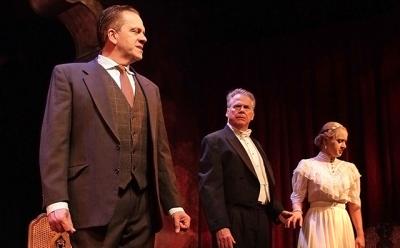Shadows in the Drawing Room at the Hampton Theatre Company

Written by one of Great Britain’s foremost men of letters, J.B. Priestley, “An Inspector Calls” is the Hampton Theatre Company’s first production of its 31st season, and a good choice it is. Full of profundity and more twists than a Bimini knot, the play is a riveting revival of an all-time classic.
In a nutshell, a mysterious police inspector shows up at the engagement dinner of an upper-class British family to interrogate everyone there, any one of whom, he explains, may have had a part, however small or seemingly insignificant, in the horrific suicide of a local girl.
If the play had ever been adapted into a Frank Capra movie, it might have been titled “It’s a Horrible Life.” If it were written today, it might be called simply “Karma Is a Bitch.”
Arthur and Sybil Birling, an industrialist and his wife in the fictional town of Brumley, are celebrating the engagement of their daughter, Sheila, to Gerald Croft, the son of Arthur’s competitor. The Birlings’ son, Eric, is also in attendance. At this point, the playwright could have easily set up a simple and fluffy drawing room comedy a la Noel Coward — shallow self-absorption clearly abounds in the Birling household.
But Priestley, who wrote “An Inspector Calls” on the tailcoats of World War II, chose to set his work on the night the Titanic sank. Even though the ship is only mentioned in passing as a wonder of the age and “absolutely unsinkable,” it sets the audience up to see that a catastrophe of mammoth proportions, however unrelated, lies ahead.
“Keep your head down and concentrate on your own business . . . every man for himself,” Mr. Birling advises his future son-in-law, moments before the mysterious Inspector Goole shows up like an iceberg to crash the party.
And to throw one more Titanic image into the mix, Sarah Hunnewell, the director, has steamlined — uh, streamlined — the script into a gripping two acts instead of the traditional three somewhat stodgy ones.
The inspector shows each person how the smallest unkindness can have huge repercussions on the life of a single individual. “We don’t live alone. We are members of one body. We are responsible for each other,” he tells them, the polar opposite of Mr. Birling’s previous words.
It would have been a quaint little whodunit to simply end with everyone being involved, sort of a pint-sized “Murder on the Orient Express.” But there’s more, and that is what gives “An Inspector Calls” its power.
“I think the inspector did it,” a woman behind us told her companion loudly in her best Lawn Guyland accent during the second act. My companion whispered, “Not. Getting. It.”
The cast is absolutely exemplary. Daren Kelly blusters like a puffed-up peacock as the head of household, Arthur Birling, a last bastion of male sacrosanctity who toasts to “lower costs and higher prices.” Susan Galardi is completely believable as the matriarchal Sybil, the resentful high-class dowager queen who sticks to her guns until the very end. Amanda Griemsmann plays the engaged Sheila with a lovely sheen beneath the frippery, bringing enough humanism to her role to instill a hope for the “future” generation. As her fiancé, Anthony Famulari is able to subtly express his vulnerability while maintaining his aristocratic air. Spencer Scott, a newcomer to H.T.C., shows an impressive range as the quietly drunken son, Eric.
And as the inspector, Edward Brennan nails it. He is able to chastise the family members for their awful behavior in a few words, while also managing to bring a certain lightness to the role, almost verging on the comedic.
Lighting, costumes, and sets by Sebastian Paczynski, Teresa LeBrun, and Peter-Tolin Baker provide the perfect and sumptuous setting for the goingson, along with a somewhat surreal backdrop that adds to the discomfiture happening center stage.
“An Inspector Calls” has everything — first and foremost, a very strong production right here in Quogue, and second, a story with a fascinating layered and ambiguous meaning. But even more than that, the play itself has a rich history, with its first production not in London but in Leningrad. Priestley’s socialist views were not popular with Winston Churchill and others sitting in the catbird seat, although the party line is that no theaters in the West End were available. When the show did premiere a year later in 1946, the cast included Ralph Richardson, Margaret Leighton, and Alec Guinness. Oh, to have been a member of that first audience!
But the past is done. Or is it? The next best thing is getting to Quogue to see “An Inspector Calls,” at the Hampton Theatre Company through Nov. 8. And to remember the words of George Santayana, a contemporary of Priestley’s, who reminded us that those who cannot remember the past are condemned to repeat it.
